 Growing older... I am all in. Growing older... I am all in. There are all sorts of jokes and memes about forgetting things more easily as we grow older. I saw a comic strip the other day which depicted someone on the top of a high mountain who quipped, “I hate it when I go somewhere and can’t remember why I went there in the first place.”* It was funny: those of us who are older will poke fun at ourselves about how we entered a room and forgot why we went there, or that we were searching for a phone that was in our pocket all along, (or worse, in our hand.) Jokes aside, I recently read an article that did not sit right with me at all. It was about measuring cognitive ability based on how older people dealt with money. The article highlighted the findings of an experiment in which they took a number of older people and created an artificial scenario that tested what they would do when they met strangers who presented a need. The subjects were 'allotted' a theoretical amount of money to keep or give. The testers connected those who gave more with having more cognitive decline than those who gave less or none at all. I guess that makes all of us (young or old) who live by the gospels, quite senile! If that is the case, count me in. 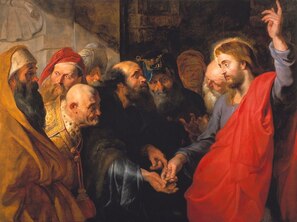 "... [repay] to God what belongs to God" "... [repay] to God what belongs to God" Psychology is a wonderful gift when a person desires help growing emotionally, is in need of healing, or has a particular mental health issue. But like all things, when something is taken out of context or when an issue is taken to the extreme, anything can become misleading and disturbing. Reading articles like this reinforces the wisdom of taking what we read or hear and keeping it in perspective using common sense, consistent with what Jesus taught about discerning right usage. For example, He did not say money was evil, but indicated it was what we do with it that makes it good or bad, such as when He told those who questioned Him, “Repay to Caesar what belongs to Caesar, but to God what belongs to God.” (Mark 12:17) Therefore, aside from avoiding the Pharisees attempt at trying to trap Him, Jesus was actually teaching about right use of what we have. Notice the wording: Jesus used the word “repay.” The Pharisees were asking about the Law and Jesus’ reply was about love. In our gratitude we ‘repay’ (or respond to) God with loving actions directed to everyone, but especially to those in greatest need. We are to give to the poor, but using discernment, we should decide how much we can give; impoverishing ourselves when we have children to feed or have other obligations would not be what God wants. We are to nurture a generous heart, but without taking things out of context and to the extreme.** 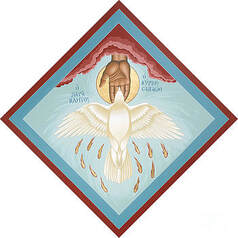 To discern is to pray To discern is to pray The one thing Jesus does want us to be extravagant with is our love, but even then we always need to discern what the truly loving thing to do is. That is, we must discern the greater good which will bring us closer to God and also does the greatest amount of good for the one to whom we minister without jeopardizing those to whom we are obligated, including ourselves. In order to live this way we must have a healthy prayer life. To discern is to pray, and in fact, it means we must pray constantly. To get a sense of the movement of the Holy Spirit we must dialogue with Him, to ask specifically, and then to listen with our heart and soul. And the best way to do that is to have an intimate relationship with God. If we desire a discerning heart we must spend time in prayer so that we can learn the way God works within our particular relationship and in how He calls us. In prayer we learn to recognize His presence and indeed, His voice. Like the disciples in Emmaus, unless we are listening to what is happening within our hearts, we will totally miss that they are burning within us. As we learn to recognize God's presence, and as we grow in love, our generosity will expand, our mercy will multiply, (especially in forgiving others), and we will grow in holiness. 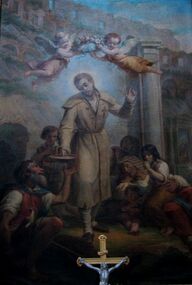 "What you do for the least ones, you do for me." "What you do for the least ones, you do for me." There is nothing of a cognitive decline in being generous with a poor stranger. It is what we are called to do as Christians and what we do in response to our love for God. When we offer our time, talent, and treasure, we give to Christ present in our least brothers and sisters: “What you do for them, you do for me.” (Paraphrase of Matthew 25:40) Jesus taught us to give to those in need, whether it is food and drink, clothing, offering comfort through a visit to the sick or the imprisoned, or simply spending time listening and praying with someone. If the world laughs at us for loving with an open hand, then let it. And if they want to say we are losing cognitive ability for being generous… well, let them. I would rather be deemed a little impaired for being as Christ to someone, then to be considered ‘all together’ for being selfish or neglectful. Don’t get me wrong, there are times to give and times to withhold, so let’s not think that anyone is selfish when they do not give monetarily or otherwise. But the fact remains, that if we are appropriately generous in word and deed to our brothers and sisters, we will find a clarity like nothing else. This clarity is indeed what love is. 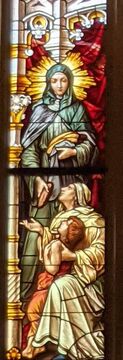 May we respond with generous hearts! May we respond with generous hearts! May we utilize the gift of discernment we were given at our Confirmation! May we grow in gratitude to God and respond with generous hearts! And in this month of the Sacred Heart, may we learn how to respond in love as Jesus would have us do! Let us meet in the Sacred Heart of Jesus! Peace! ©Michele L. Catanese *The comic mentioned is called Macanudo by Liniers. His comic strip is one of my favorites. You can find the particular strip I referred to at https://comicskingdom.com/Macanudo/2022-06-19 More about the Argentinian artist, Liniers, and his comic strip can be found at https://comicskingdom.com/Macanudo/about ** Speaking of context: Some may be thinking, “But what about the widow who gave her two cents in Luke 21:1-4? Does it not say Jesus praised her for giving her entire livelihood?” Yes, He did say this, but again we have to put it into context. Jesus was using hyperbole, a Jewish teaching method of exaggerating a point so as to make it clear. In this case, Jesus was pointing out the hypocrisy of the Pharisees who were pretentious and haughty, making a show of their giving, as opposed to the widow who was giving in obscurity and humility. This teaching was about humility and not about money, as such. Images: 1. My photo, birthday cake. 2. Painting, Caesar's Coin by Peter Paul Rubens, (1612-14). (Public Domain) 3. Image, The Holy Spirit The Lord the Giver of Life The Paraclete Sender of Peace by Fr. William Hart McNichols. You can find this image and if you wish, purchase a copy in one of many mediums at fineartamerica.com/featured/the-holy-spirit-the-lord-the-giver-of-life-the-paraclete-sender-of-peace-093-william-hart-mcnichols.html 4. My photo of a painting of St. Benedict Joseph Labre from Santa Maria ai Monti in Rome, Italy. This painting hangs by St. Benedict Joseph's tomb in Santa Maria ai Monti. He died on the steps of this church. He was a pilgrim (beggar) who gave everything given to him to those poorer than himself. 5. My photo of some stained glass in the Basilica of St. John the Baptist in Savannah, Georgia. Note: In compliance with GDPR rules, I wish to make it clear that I do not gather any information on any of my readers at any time.  "And this he shall write on his hand, 'The Lord's.'" (Is. 44:5) "And this he shall write on his hand, 'The Lord's.'" (Is. 44:5) On a trip to South Carolina I had the opportunity to tour historic Charleston. Part of the tour included walking on a pathway made from 200 year old bricks, some of which had tiny handprints embedded in them. These handprints are those of the children who made them; that is, the bricks were made by children who were enslaved. While children are known to enjoy leaving their handprints in wet cement, or in this case wet clay, it is obvious that these prints were not made for playful reasons. Most of them were probably made unintentionally, but it seemed to me that some of the handprints were perhaps left as a way of letting others know that they wanted to be remembered, to have their lives be noticed and given the dignity they deserved. Whatever the reasons, the handprints are a reminder that no matter what, we are always within the sight of God. Jesus taught His followers that although we may endure hardship in this life, God is with us and we will have joy in heaven with Him. However, it remains that while in this life, we all have a basic need to be validated and to know we are important to someone. Even though we know God sees us, we still yearn to be treated with dignity, to be noticed, valued, and to not be forgotten. But no matter what happens, we can cling to what Jesus told us: every hair of our head is counted and therefore we are never forgotten by God even for a fraction of a second. He is always surrounding us with His love and mercy, especially when we feel it least and need it most. 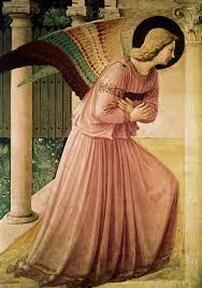 "We are made little less than the angels" "We are made little less than the angels" In regard to this, Psalm 8 is fitting, especially because the writer seems to understand not only the dignity of each person, but also that every human glorifies God simply by existing. The Psalmist expounds on the beauty of the heavens, the moon and the stars, and then asks, “What are we that you should be mindful of us?” That is, God made all the beauty of the heavens and the earth, and yet deems us more important than these, perhaps as more beautiful than the rest of creation. The tiny handprints on the bricks can be a reminder that all of us are made “little less than the angels… crowned with glory and honor.” In Psalm 139 we read that God knows “when I sit and when I stand; you understand my thoughts from afar…. If I go to the heavens, you are there; if I sink to the nether world, you are present there. …if I settle at the farthest limits of the sea, even there your hand shall guide me and your right hand hold me fast.” (Psalm 139: 2, 8-10) God made us for more than one reason: of course, He made us simply because He loves us, but He also made us to contribute something to the rest of humanity, no matter how great or small, how seen or unseen by others.  "Are not five sparrows sold for two small coins?" "Are not five sparrows sold for two small coins?" In Luke’s Gospel, Jesus went into great detail about how God sees and cares for us.* He said, “Are not five sparrows sold for two small coins? Yet not one of them has escaped the notice of God. Even the hairs of our head have all been counted. Do not be afraid.” (Luke 12:6-7) The key is in taking to heart the last line: “Do not be afraid.” Indeed, we are always within His vision, but it takes radical trust to accept this. That Jesus repeats this assurance many times throughout His ministry and even after the Resurrection should be evidence enough that He really wants us to trust Him and therefore, to be at peace. Everything is in God’s hands and thus, His love and mercy are gifts to be savored. Once we accept in our heart that we are so loved by God, however, Jesus outlines the ways in which we are to do for others what God does for us. This means we are to be a witness to our faith unapologetically, that is, to live what we have been taught, and in all things act with love. To be a follower of Jesus means that ‘what we are given without cost we are to give as a gift.’ (Paraphrase of Matthew 10:8) Therefore, we need to look past our own selves, trusting that we are completely in God’s care, and with love, look to help others who may have great needs or perhaps who simply want to be noticed and remembered for the beauty of being our brother or sister. 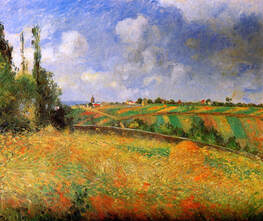 The beautiful handiwork of God. The beautiful handiwork of God. The Church dedicates the entire month of June to the Sacred Heart of Jesus, a celebration of His unfathomable love.** In light of this, it is good to reflect upon the love we have received and the actions of love to which we are called. Reading and praying with the Sermon on the Plain and the other Gospel discourses of Jesus, particularly in Matthew and Luke, would be helpful as a reminder of how loved we are and how we are enjoined to love others as we are loved. God’s loving handprint is on each of His children, and in a similar way we, too, are called to leave an imprint of love, no matter how small it may seem, upon everyone we encounter. And if we do so, we will see the beautiful handiwork of God ever more clearly as we build the Kingdom with Him, one loving act at a time. 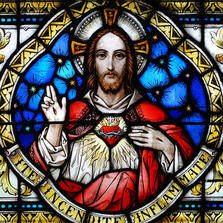 May the fire of Jesus' love burn in our hearts! May the fire of Jesus' love burn in our hearts! May we pray that the fire of love that burns within the Sacred Heart of Jesus would also burn in our hearts! May we live in the dignity with which we were created and acknowledge that same dignity in all our brothers and sisters! And may we be moved to put love into action through works of mercy and compassion! Let us meet in the Sacred Heart of Jesus! Peace! ©Michele L. Catanese *The discourses in Luke’s Gospel and in Matthew’s Gospel share the same basic content, particularly the Sermon on the Plain and the Sermon on the Mount, respectively. For those who wonder why Matthew set this discourse on a mountain side and Luke did not: Matthew was writing to an audience of Jewish converts who were very familiar with God’s revelations upon mountains, especially when He gave the Law to them. This was representative of God as being on high and so they had great reverence for God’s revelation in this way. For Luke’s Greek convert audience a mountain setting would have been too intimidating; they would have wanted nothing to do with it because mountain revelations meant trouble. Remember, in Greek mythology the gods lived on Mt. Olympus and they did nothing but wreak havoc on humanity to accomplish their own selfish ends. Thus, to set this important discourse on a plain was symbolic of God ‘making level the field’ so to speak, entering into our world in a non-intimidating and radical way. However, the quote used above from Luke is found in a later discourse, the content of which Matthew used in the Sermon on the Mount. Simply, the authors organized their gospels differently to reach out to their different audiences. **June 24 is the Solemnity of the Most Sacred Heart of Jesus, but it is traditional for the entire month to be dedicated to this devotion. Images: 1. Painted image, Isaiah 44-5, Fr. William Hart McNichols. If you are interested in obtaining this image in one of a variety of formats, it can be found at https://fineartamerica.com/featured/isaiah-44-5-william-hart-mcnichols.html 2. Painting, inset of the Archangel Gabriel from The Annunciation, Blessed Fra Angelico. 3. My photo, taken in Hawaii. (I know it is not a sparrow, but it works.) 4. Painting, Fields, 1877 by Camille Pissarro. 5. My photo of stained glass, Sacred Heart of Jesus. Note: In compliance with GDPR rules, I wish to make it clear that I do not gather any information on any of my readers at any time. |
Heart Speaks to Heart
|

 RSS Feed
RSS Feed

